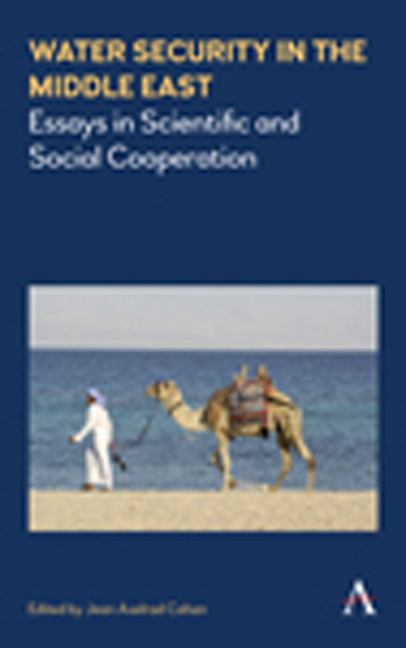Book contents
- Frontmatter
- Contents
- List of Illustrations
- Acknowledgments
- Foreword
- Introduction Water Security in the Middle East: A Role for the Social Sciences and Humanities
- Chapter 1 Cooperation Rules: Insights on Water and Conflict from International Relations
- Chapter 2 Water Security in Transboundary Systems: Cooperation in Intractable Conflicts and the Nile System
- Chapter 3 Water-Demand Management in the Arab Gulf States: Implications for Political Stability
- Chapter 4 A Watershed-Based Approach to Mitigating Transboundary Wastewater Conflicts between Israel and the Palestinian Authority: The Besor-Hebron-Be'er Sheva Watershed
- Chapter 5 The Evolution of Israeli Water Management: The Elusive Search for Environmental Security
- Chapter 6 Adapting to Climatic Variability along International River Basins in the Middle East
- Chapter 7 Water and Politics in the Tigris-Euphrates Basin: Hope for Negative Learning?
- Chapter 8 The Political and Cultural Dimensions of Water Diplomacy in the Middle East
- Notes on Contributors
- Index
Introduction - Water Security in the Middle East: A Role for the Social Sciences and Humanities
- Frontmatter
- Contents
- List of Illustrations
- Acknowledgments
- Foreword
- Introduction Water Security in the Middle East: A Role for the Social Sciences and Humanities
- Chapter 1 Cooperation Rules: Insights on Water and Conflict from International Relations
- Chapter 2 Water Security in Transboundary Systems: Cooperation in Intractable Conflicts and the Nile System
- Chapter 3 Water-Demand Management in the Arab Gulf States: Implications for Political Stability
- Chapter 4 A Watershed-Based Approach to Mitigating Transboundary Wastewater Conflicts between Israel and the Palestinian Authority: The Besor-Hebron-Be'er Sheva Watershed
- Chapter 5 The Evolution of Israeli Water Management: The Elusive Search for Environmental Security
- Chapter 6 Adapting to Climatic Variability along International River Basins in the Middle East
- Chapter 7 Water and Politics in the Tigris-Euphrates Basin: Hope for Negative Learning?
- Chapter 8 The Political and Cultural Dimensions of Water Diplomacy in the Middle East
- Notes on Contributors
- Index
Summary
This volume is based on papers presented at a small conference, “Water Security and Peacebuilding in the Middle East: Avenues for Cooperation,” held at the University of Nebraska in May 2014. The meeting brought together leading researchers in the multidimensional problem of water security and related public policy issues. Since our focus was on the Middle East, the scholars invited were specialists in areas ranging from Ethiopia, to Israel and Palestine, to Iraq and the Gulf States. While generally aiming to underscore the efficacy of international water agreements, institutional mechanisms designed to implement them and scientific and technological advances that could be “game changers,” the contributors nonetheless pointed to significant obstacles to cooperation and peace building. As the chapters that follow indicate, the authors are aware of the problems created by great inequalities of economic, political and military power throughout the region. And they share my view that a widened intellectual and disciplinary perspective is essential if wide and long-term shifts in attitudes toward water security are to be achieved.
The Need for a Broad Approach
In the famous opening to his work Negative Dialectics (1966), one of the foremost Western philosophers of the post– World War II era, Theodor Adorno, declared, “Philosophy, which once seemed obsolete, lives on, because the moment to realize it was missed” (Adorno, 2007, 3). By this statement he wanted to convey that, during the greatest political and human crises of the twentieth century, philosophers (among others) failed to concretize philosophy's most significant ideas regarding freedom and human possibility.
It may not be an exaggeration to say that philosophy and the humanities in general are faced with almost equally great challenges today. We are presently trapped in seemingly irreversible vectors of degradation of the planet's nonrenewable as well as renewable resources; vast economic and social inequalities; increasing urban populations and resultant economic and political pressures; and ideological and ethnic conflicts worldwide. Inadequacy and instability of water supplies worldwide must be numbered among these increasingly difficult circumstances, whether water insecurity is potentially a direct cause of armed conflict, as many have argued, or “merely” an exacerbating factor (Chellaney 2013; Wolf 1995; Abukhater 2013).
- Type
- Chapter
- Information
- Water Security in the Middle EastEssays in Scientific and Social Cooperation, pp. 1 - 18Publisher: Anthem PressPrint publication year: 2017



